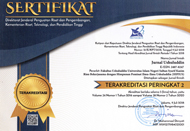Cosmological Interpretation: A View of Wind Concept Shi’a Literature
Abstract
Keywords
Full Text:
PDFReferences
Abisaab, Rula Jurdi, “Muhammad Baqir Majlisi,” dalam Richard C. Martin (ed.), Islam and the Muslim World, Vol. 2, New York: Macmillan, 2004.
Azizy, Jauhar, “Corak Ilmi dalam Tafsir Kemenag (Edisi Yang Disempurnakan),” dalam Ulul Albab, Jurnal Studi Islam, Vol. 15, No. 2, 2014, DOI: http://dx.doi.org/10.18860/ua.v15i2.2667
Barbour, Ian G., Juru Bicara Tuhan Antara Sains dan Agama, terj. E.R. Muhammad, Bandung: Mizan, 2002.
Baiquni, Achmad, Al-Qur`an dan Ilmu Pengetahuan Kealaman, Yogyakarta: PT. Dana Bhakti Prima Yasa, 1997.
Fajri MR, Nurul. dalam Taufik Abdullah (ed.), Ensiklopedi Tematis Dunia Islam (Khilafah), Vol. 2, Jakarta: Ichtiar Baru Van Hoeve, t.th.
Gracia, Jorge J. E., A Theory of Textuality The Logic and Epistimology, (New Work: State University of New York, 1995.
Hadiwijono, Harun, Sari Sejarah Filsafat Barat 2, Yogyakarta: Kanisius, 2007.
Hairi, Abdul-Hadi, “Mullā Muḥammad Baķir” dalam C.E. Bosworth (ed.), The Encyclopaedia of Islam, Vol. 5, Leiden: E.J. Brill, 1986.
Ibn Manẓūr, Jamāl ad-Dīn Muḥammad ibn Jalāl ad-Dīn al-Anṣārī al-Khazrajī al-Ifrīqī, Lisān al-ʻArab, Vol. 5, Kairo: Dār al-Maʻrifah, t. th..
June, Tania dalam Handoko (ed.), Klimatologi Dasar, Landasan Pembahasan Fisika Atmosfer dan Unsur-unsur Iklim, Jakarta: Pustaka Jaya, 1995.
Kohlberg, Etan, “Beḥār al-Anwār,” 1989, Vol. IV, Fasc. 1, pp. 90-93, http://www.iranicaonline.org/articles/behar-al-anwar, diakses 05 Mei 2018.
________, “al-Majlisī” dalam Mircea Eliade (ed.), The Encyclopedia of Religion, Vol. 9, New York: Macmillan Library, 1995.
Kuntowijoyo, Penjelasan Sejarah (Historical Explanation), Yogyakarta: Tiara Wacana, 2008.
Mazzaoui, Michel M., “Muḥammad Bāqir al-Majlisī,” dalam John L. Esposito (ed.), The Oxford Encyclopedia of the Modern Islamic Word, Vol. 3, New York: Oxford University Press, 1995.
Muttaqin, Ahmad, “Konstruksi Tafsir Ilmi Kemenag RI-LIPI: Melacak Unsur Kepentingan Pemerintah dalam Tafsir,” dalam Religia, Vol. 19, No. 2, Oktober 2016.
Nasution, Harun, Islam Rasional, Bandung: Mizan, 1998.
Newman, Andrew J., “The Recovery of the Past: Ibn Bābawayh, Bāqir al-Majlisī and Safawid Medical Discourse,” dalam Iran, Vol. 50 (2012), 109-127. Retrieved from http://www.jstor.org/stable/24595841.
Patterson, Charles H., Western Philosophy Volume II, Lincoln: Cliff’s Notes Incorporated, 1971.
Pranata, A.M.W., Epistemologi Dasar, Suatu Pengantar, Jakarta: Yayasan Proklamasi, CSIS, 1987.
Qurṭubī, al, Muḥammad ibn Aḥmad ibn Abī Bakr ibn Farḥ, Tafsīr al-Qurṭubī, Vol. 18, Kairo: Dār al-Syaʻbin, 1372.
Rāgib al-Iṣfahānī, al, Abū al-Qāsim al-Ḥusain ibn Muḥammad, Al-Mufradāt fī Garīb al-Qur’ān, diedit oleh Muḥammad Khalīl ʻĪtānī, Beirut: Dār al-Maʻrifah, 1998.
Salus, Ali Ahmad, Ensiklopedi Sunnah-Shi’a Studi Perbandingan Aqidah & Tafsir, terj. Bisri Abdussomad dan Asmuni Solihan Zamakhsyari, Vol.1, Jakarta: Pustaka Al-Kautsar, 2001.
Syarifuddin, M. Anwar dan Jauhar Azizy, “THEMATIC SCIENTIFIC INTERPRETATION OF THE QUR’AN IN INDONESIA” (International Conference on Qur’an and Hadith Studies (ICQHS 2017), Atlantis Press, 2017), https://doi.org/10.2991/icqhs-17.2018.7.
Shihab, M. Quraish, Membumikan Alquran Fungsi dan Peran Wahyu dalam Kehidupan Masyarakat, Bandung: Mizan, 2001.
Ṭabrānī, al-, Sulaiman ibn Aḥmad ibn Ayyūb Abū al-Qāsim, Al-Muʻjam al-Kabīr, Vol. 11, Mūṣaul: Maktabah al-‘Ulūm wa al-Ḥikam, 1984.
Wendry, Novizal, “Tafsir Esoterik al-Majlisiy dalam Biḥār al-Anwār," Jurnal Penelitian Keislaman, Vol. 7, no. 1 (2010).
DOI: http://dx.doi.org/10.24014/jush.v27i2.7244
Refbacks
- There are currently no refbacks.
 Jurnal Ushuluddin Indexed By:
Jurnal Ushuluddin Indexed By:
Alamat Redaksi:
 Fakultas Ushuluddin UIN SUSKA Riau Jl. H.R. Soebrantas KM. 15,5 Panam – Pekanbaru
Fakultas Ushuluddin UIN SUSKA Riau Jl. H.R. Soebrantas KM. 15,5 Panam – Pekanbaru
 E-mail: jurnal.ushuluddin@uin-suska.ac.id
E-mail: jurnal.ushuluddin@uin-suska.ac.id
ejournal: http://ejournal.uin-suska.ac.id/index.php/ushuludin

Jurnal Ushuluddin is licensed under a Lisensi Creative Commons Atribusi 4.0 Internasional.

















